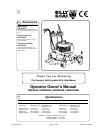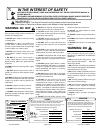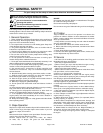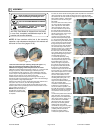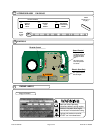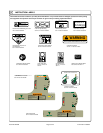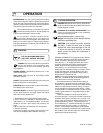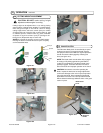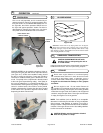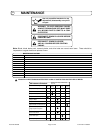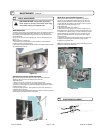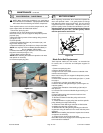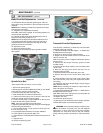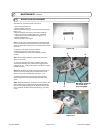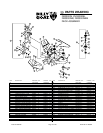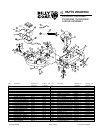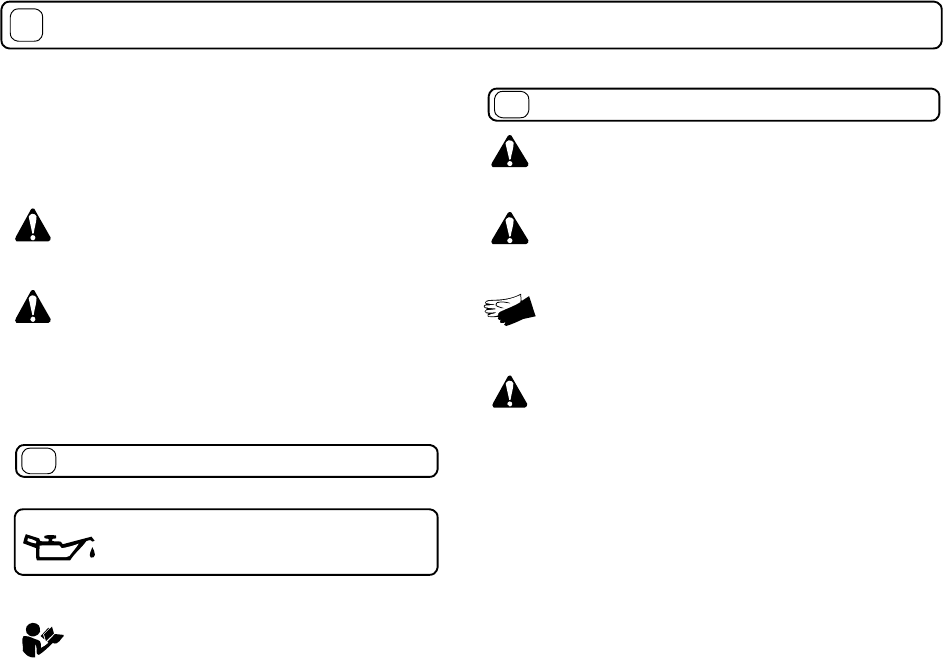
Part No. 520166 Form No. F112003A
Like all mechanical tools, reasonable care must be
used when operating machine. Do not operate unit
in areas where bystanders may be present.
Do not operate if excessive vibration occurs.
If excessive vibration occurs, shut engine off
immediately and check for damaged or worn blade, loose
blade jam nut, loose engine or lodged foreign objects.
Note: See maintenance section for proper blade jam nut
torque specifi cations.
ENGINE: See engine manufacturer’s instructions
for type and amount of oil and gasoline used.
Engine must be level when checking and fi lling
oil and gasoline.
ENGINE SPEED: Controlled by throttle lever on the
control console plate.
FUEL VALVE: Move fuel valve to "ON" position (when
provided on engine).
CHOKE: Operated with the throttle control by moving the
throttle control to the full start position.
THROTTLE: Move remote throttle control to fast position.
Pull starting rope to start engine.
ELECTRIC START: Choke the engine if necessary. Pull
up then push forward on the toggle switch until engine
starts, then release switch to run.
1. Select desired cutting height before starting engine.
2. Place mower on a sidewalk or driveway where the
mower blade is in an unloaded condition. If it must be
started on the lawn, move mower over previously cut
grass.
3. Be sure drive lever or blade lever are not engaged.
4. Choke if necessary.
5. Pull back on starter rope slowly until resistance is felt.
Then pull cord rapidly to start. Repeat if necessary.
CUTTING OPERATION
PUT OIL IN ENGINE THEN CHECK
THE LEVEL BEFORE STARTING.
OPERATION
16
16.1
STARTING
16.2
INTENDED USE: This unit is mainly designed for cutting
grass. Some overgrown weeds, and taller grass may also
be cut. Be sure to inspect work area and machine before
operating. Make sure that all operators of this equipment
are trained in general machine use and safety.
CAUTION: Use extreme care when operating
the blade. Inspect the work area for foreign
objects that could cause damage to the unit
or injure the operator if struck by the blade.
Never operate the blade with bystanders in
the work area.
Wearing durable gloves, remove clog.
Danger, the clog may contain sharp materials.
Reconnect spark plug wire.
CAUTION: Stop Blade when crossing gravel drives,
walks or roads and under all conditions where thrown
objects might be a hazard.
CLEARING A CLOGGED CUTTING DECK: Turn
engine off and wait for blade to stop completely.
Disconnect spark plug wire.
Page 7 of 20
GENERAL OPERATION: To engage the blade, depress
the operator’s left hand control lever against operator’s
handle. The blade is disengaged by releasing this
lever.(See Fig. 1.1) To engage the wheel drive, lift the
operator’s right hand control lever against operator’s
handle. The drive is disengaged by releasing this
lever.(See Fig. 1.2) Ground speed can be varied by
shifting gears as described on page 8. To begin cutting,
engage the blade lever, allow the blade to spin up to
speed, and engage the wheel drive to begin moving
forward into the material to be cut.
NOTE: Do not engage blade during transport between
work sites. The blade should remain disengaged at all
times when work is not being performed.
The best performance is achieved when cutting in
dry conditions. If the deck becomes choked with grass
or debris during operation, back unit off of debris allowing
machine to clear itself and continue cutting, or shut the
unit off and clear the clog by hand (See above). A drop
in engine RPM or a noticeable change in engine sound is
usually a good indicator of a clogged discharge or other
interference.
Under most conditions cutting should be done in
second or third gear. Fourth gear should be reserved for
conditions where grass is thinned out or not as tall. The
quality of the cut produced is directly related to the unit's
ground speed during cutting. If the quality of the cut
is not satisfactory (i.e. material left standing) you should
shift into a lower gear during cutting. For improved
control in confi ned areas, this machine can be pushed
forward or backward by releasing the drive lever located
at the bottom of the operator's right-hand handle while
depressing the brake release lever.



